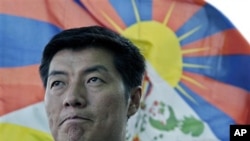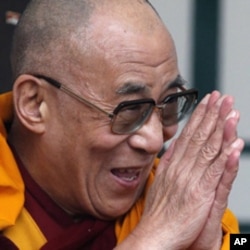Tibet is officially under Chinese control. But the region's Buddhists have long considered the Dalai Lama as their leader.
Now, the 75-year-old exiled spiritual leader is stepping down from politics.
And Wednesday, the Tibetan government-in-exile announced who will take his place. Lobsang Sangay, a scholar at the prestigious Harvard Law School in the United States, has been elected kalon tripa, or prime minister, of the Tibetan government-in-exile. Sangay won 55 percent of all votes cast by tens of thousands of Tibetans around the world in recent elections, beating out two other candidates.The 42-year-old Sangay has served as leader of the Tibetan Youth Congress, which demands Tibet's complete independence from Chinese rule.
Mary Beth Markey, the president of the International Campaign to Save Tibet, knows Sangay personally. She tells VOA's Sarah Williams about the exiled government's newest political leader.
Who is Lobsang Sangay?
"I'm very pleased to know Lobsang Sangay. He has testified before the United States Congress in the past on the issue of Tibet, and I principally know him from his visits to Washington as an expert on international law and how it applies to the Tibetan people. He has a doctorate of law and masters of law from Harvard University in the United States and he is an articulate representative of Tibetan issues and has been in Washington on occasion."
Has he ever lived in Tibet?
"No, he hasn't lived in Tibet. He was born in a Tibetan refugee community in Darjeeling, India, and grew up in India like many Tibetans of his generation in their 40's. I guess he's not really had much opportunity because of that to really spend time in Tibet. He has tried to visit Tibet. It's normal, unfortunately, though not appropriate, but the Chinese do withhold visas from many Tibetans who wish to return to Tibet and I believe that was the case for Lobsang."
Do you know how he will in the future deal with China on the Tibetan issue?
"No, I don't. The role of the has been predominantly an administrative role within the Tibetan exile government, or I should say at the top of the exile government, and has been more prominent in recent years on the international stage.
|
Listen to the entire interview on Lobsang Sangay
|
Certainly as the Dalai Lama had a very close relationship with the current kalon tripa, Professor Samdhong Rinpoche, and raised his visibility and ceded a great deal of authority to him. That process as we all know has been accelerated or is being accelerated, according to the Dalai Lama's desire to completely devolve his political authority in the government in exile.
I imagine Lobsang Sangay, who is somebody who is well traveled, who has lived in the West, will spend much more time as an international advocate for Tibet than previous kalon tripas have. And in that capacity, I'm sure he will articulate the policy of the Tibetan government in exile towards China. And he has been able in academia to reach out very deliberately to Chinese academics. This has been a diplomatic track that I think is important. It has been fruitful in that the exchanges have been frank and seem to be genuine, something that you don't often get at the very highest level with the Chinese."





